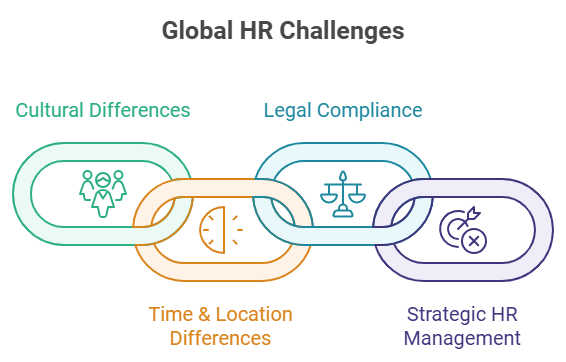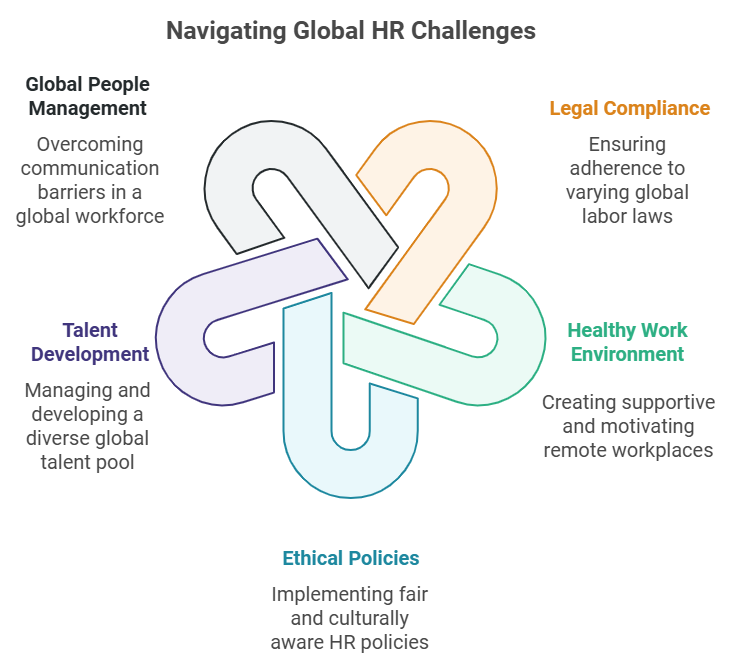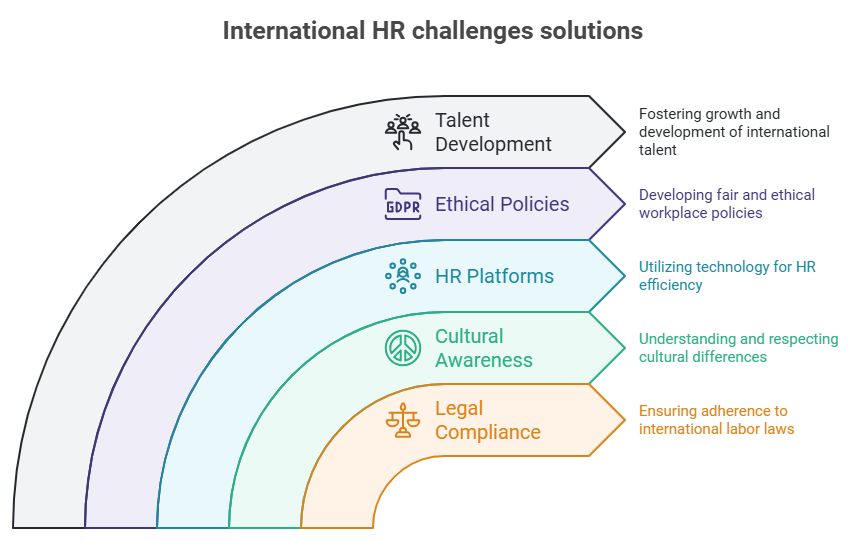
As remote work and globalization expand, so will the need for workforce planning concerning international employees. This will help organizations with building up their applicant pool, pursuing plans into international territory, new competencies and more, but one thing is for certain. Your organization’s human resource department will have to learn to navigate international HR challenges for human resources.
Managing domestic teams can already be difficult but adding the challenge of time zones and cultural differences can make an unprepared team unable to thrive. This can lead to an increase in turnover rate and inconsistent employer branding which will hurt your organization in the long run and decrease talent acquisition.
Related articles:
How to Comply with Labor Law Poster Requirements for Remote Employees?
Why the Future of HRIS is Composable Applications
.
Why Do Global Companies Face More Challenges?
Organizations that have expanded their business to other countries may face international HR challenges due to cultural differences, time zones, and the failure to maintain legal compliance with labor laws. Human resource officers must excel at communication and devise strategic management systems to oversee employees all over the world.
One way to accomplish this is through using centralized HR platforms, such as PeopleSpheres, to allow global employees to collaborate, communicate, and stay engaged remotely. Through a software, HR management will be able to be manageable and facilitate all HR functions and allow to access strategic HR.
Time & Location Differences
When working with international departments and employees, it may be difficult to stay up to date on company news and events since one side of the world is working while the other is asleep. This is why having a strong and connected HRM team is imperative to the success of international business. HR professionals should ensure that all employees have the resources needed and training to flourish at your organization no matter the location or time of day. Through the staffing of international employees, one has to be more lenient towards deadlines and provide tasks with a consideration that communication may have a negative factor towards the deadline. One has to approach this in a matter that is more towards strategic HR such as paying attention to feedback coming from someone who is in that country. Having increased labor-relations from the other countries your company is working from, will increase employee performance as their will be more opinions on the table from people who have first-hand experience.
Cultural Differences
Since international organizations hire all around the world, your workforce will encounter many cultural differences, such as language, race, and ethical norms. It is of utmost importance to understand different cultures in the international areas your business is operating in. When employees feel unwelcomed and disrespected, employee retention rates and employee satisfaction drop significantly which can lead to even more international HR issues. Always have the competency to understand how to engage diverse employees and navigate cultural norms when working with international employees by constant research and overseeing how workers react to the company’s actions. This can be from understanding how work life is controlled to how recruitment of a new employee is handled in that country.

Top 5 HR International Challenges in the Global Workforce
When growing and attracting new talent into your company internationally, make sure your HR department is aware of the many international human resource issues that may arise concerning performance management and employee development. Differences in time and culture can bring about many international HR challenges, such as breaking local employment laws, creating a healthy work environment, administering ethical HR policies, managing people globally, and training international talent.
1. Breaking Local Employment Laws
One international human resource management challenge that your human resource department needs to be prepared for is global employment laws. When hiring outside of your organization’s typical area of operation, ensure that your HR department has read up on local labor laws in that particular country. Failure to maintain legal compliance may impact your organization’s image and work-force branding. Labor laws are different from country to country, so stay up to date on new HR developments around the globe.
2. Creating a Healthy Work Environment
Forming a healthy work environment remotely is one of the most important international challenges for HR professionals to conquer. It may be difficult to motivate teams to reach business goals and build genuine connections amongst different departments. If the work environment is not addressed before building teams across the globe, your organization’s efficiency and retention rates will suffer significantly.
But, how can you create a healthy remote work environment from afar? Your organization should strive to dedicate time to team building, host annual events for teams to meet, encourage participation, and listen to the needs of your employees. Remember who is the base of your business, respect and treat employees well and they will do the same to your organization and its clients.
3. Administering Fair and Ethical Policies
When your organization’s workplace expands globally, your HR department will need to understand the ethics of different cultures around the globe. As labor laws change from country to country, so will ethics.
Some key international ethical issues to look out for may surround the topics of data, privacy, and compensation. These potential international HR problems can be easily addressed through training. Lack of awareness can damage your organization’s reputation and relations overseas, so it is imperative to train all employees on international business ethics.
Another policy that is mandatory is regarding equal employment around the world. Any human resources personnel should consider this their mission to keep in recruiting and dealing with any HR services. Have a handbook of employment laws and policies you want to encourage more into the company and what are the main ones in that specific country. Make sure to let employees know that any employee assistance is there at their disposition.
4. Training and Development of Talent
Since your organization is expanding to international territory, your company’s workforce will expand too and will be in need of organizational leadership. Make sure that your HR department is ready to manage a larger pool of talent virtually. When human resource departments get swamped with all the HR systems, skill gaps and trainings can easily be missed or mismanaged. Stay on top of training and development with a unified HR platform that brings all your learning management systems together.
When recruiting and trying to acquire international talent, ensure that your recruiters know how to find international candidates and the cultural awareness needed to recruit new hires with the right qualifications for years to come. This talent management, will ensure that new candidates aren’t discouraged and have a good onboarding process.
5. Managing People All Over the World
As companies expand overseas, new employees will most likely be in a time zone far from yours and may communicate in another language. Both of these matters can lead to the largest HR international challenge, communication problems. Communication is huge when working domestically or internationally. As the world moves to remote work, you may not have the chance to meet your team in person for months. So, creating a human connection may be difficult as well.
One way to address this is through a centralized HR system that can connect employees from all over the globe to promote teamwork and productivity. As for employees, every team player should attempt to document their work, communicate with all team members, and meet frequently to ensure everyone is within the same page of organizational change.

Is There a Solution?
Human resource departments must understand the importance of international HR issues and how much damage can come from the failure to comply with international labor laws and lack of cultural awareness amongst employees. Expanding your organization overseas is already difficult enough already, your company can dodge international human resources issues by preparing the human resource team well and giving them the resources they need to succeed.
One of the easiest ways to tackle any communication or ethical problem before they occur is by using a centralized HR platform to connect your employees from wherever they are based. When determining what HR platform to use, look for a mobile-friendly system, a central notification center, and a seamless employee experience.
HR platforms, such as PeopleSpheres, can boost communication, collaboration, and self-reliance amongst international teams. With this new human resources management, you can consolidate your data into one platform to optimize your time and eliminate data re-entry. From payroll to the simplification of the hiring process, you can add your information to the cloud, get rid of all HR-related paperwork and all HR processes that are redundant.
Legal compliance, ethics, and cultural awareness should be at the top of every international HR team’s priority list. Ensure that your team is prepared to manage international labor laws, virtual work environments, ethically-sound policies, development of international talent, cultural differences, and more when conducting international business. Make sure to have in your organization policies for equal employment opportunity as well to comply with newer policies and make sure that your policies comply with the employment laws of that country.





-640x380.jpg)